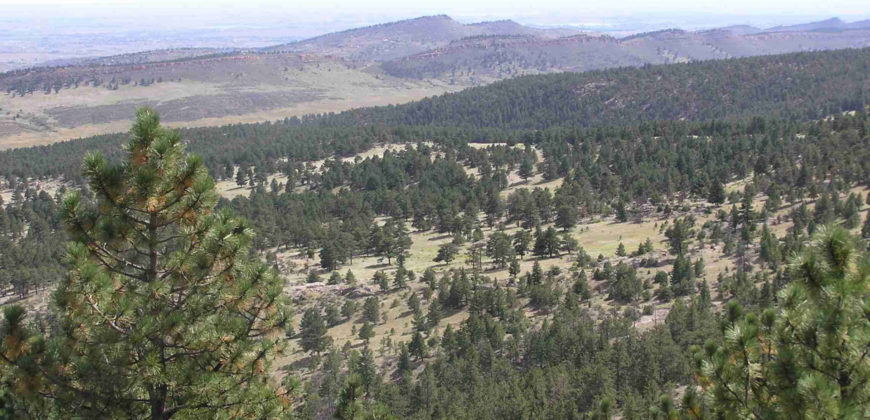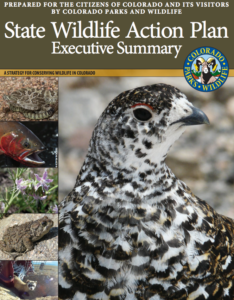
This story was adapted from a press release written by Colorado Parks and Wildlife.
Colorado’s latest State Wildlife Action plan now includes an assessment of how key habitat types could be impacted by a changing climate, and the collaborative effort that produced the analysis has received a national award.
Two programs from Colorado State University, including the Colorado Natural Heritage Program and the Department of Interior North Central Climate Science Center, collaborated with Colorado Parks and Wildlife to create the plan.
The team received an honorable mention in the 2016 Climate Adaptation Leadership Awards for its efforts to incorporate the consideration of climate change in Colorado’s 2016 State Wildlife Action Plan.
The award was announced June 7 by the National Fish, Wildlife and Plant Climate Adaptation Strategy’s Joint Implementation Working Group.
Critical planning for species and habitats
State Wildlife Action Plans are revised every 10 years and identify priority species and habitats that need conservation efforts in the state. The plan also outlines potential conservation actions that can address threats to these species and habitats.
 “Colorado’s SWAP is a vital conservation planning tool for resource and land managers,” said Reid DeWalt, CPW’s assistant director of wildlife and natural resources. “By incorporating climate change into our revised plan, we are ensuring that we are working with the most up-to-date and scientifically sound information to help conserve our wildlife resources now and into the future.”
“Colorado’s SWAP is a vital conservation planning tool for resource and land managers,” said Reid DeWalt, CPW’s assistant director of wildlife and natural resources. “By incorporating climate change into our revised plan, we are ensuring that we are working with the most up-to-date and scientifically sound information to help conserve our wildlife resources now and into the future.”
The collaborative effort to update Colorado’s SWAP included a rigorous and scientifically based climate change impact analysis of habitat for the state’s wildlife resources. The North Central Climate Science Center — a partnership between the Department of Interior and a regional university consortium that includes CSU, University of Colorado Boulder, University of Nebraska, Montana State University, University of Wyoming, Colorado School of Mines, The University of Montana, Iowa State University and Kansas State University — contributed additional expertise and resources to help shed light on how climate is expected to affect habitats in the future.
Through this collaboration, CPW and CNHP were also able to make use of an innovative collaborative workspace, the U.S. Geological Survey’s Resource for Advanced Modeling facility, which allows users to visualize potential future scenarios for wildlife and habitat.
“CNHP was delighted to serve as a bridge bringing wildlife experts and climate scientists together in our work to improve the State Wildlife Action Plan,” said CNHP Director David Anderson. “We expect that the partnerships arising from this effort will continue to benefit conservation in Colorado for years to come.”
Jeff Morisette, director of the North Central Climate Science Center, also applauded the concerted effort. “The open communication and collaboration among the three groups allowed us, collectively, to refine project objectives and methods, and, through these refinements, co-produce a more credible, salient and legitimate end product,” he said.
Colorado in the national spotlight
Of 47 nominations for the awards, 14 groups were recognized (seven recipients and seven honorable mentions) for outstanding leadership in advancing adaptation of the nation’s valuable fish, wildlife and plant resources in a changing climate.
The Climate Adaptation Leadership Award was established as part of President Obama’s plan for Enhancing the Climate Resilience of America’s Natural Resources, which identified key actions across the federal government to support resilience of America’s vital natural resources and the people, businesses and communities that depend on them.
The award is sponsored by the National Fish, Wildlife, and Plant Climate Adaptation Strategy’s Joint Implementation Working Group in partnership with the Department of the Interior, U.S. Fish and Wildlife Service, U.S. Department of Agriculture’s National Resource Conservation Service, National Oceanic and Atmospheric Administration, U.S. Forest Service and the Association of Fish and Wildlife Agencies.
The inclusion of climate impacts in the State Wildlife Action Plan, approved March 30 by the U.S. Fish and Wildlife Service, was specifically called for in the Colorado Climate Plan.
This year marks the first year of Climate Adaption Leadership Awards for Natural Resource recipients. For more information about the awards, including the other recipients and honorable mentions, visit the Climate Adaptation Leadership Award website.
The Department of the Interior North Central Climate Science Center is managed by the U.S. Geological Survey and hosted by Colorado State University. The center is one of eight that provide scientific information to help natural resource managers respond effectively to climate change.